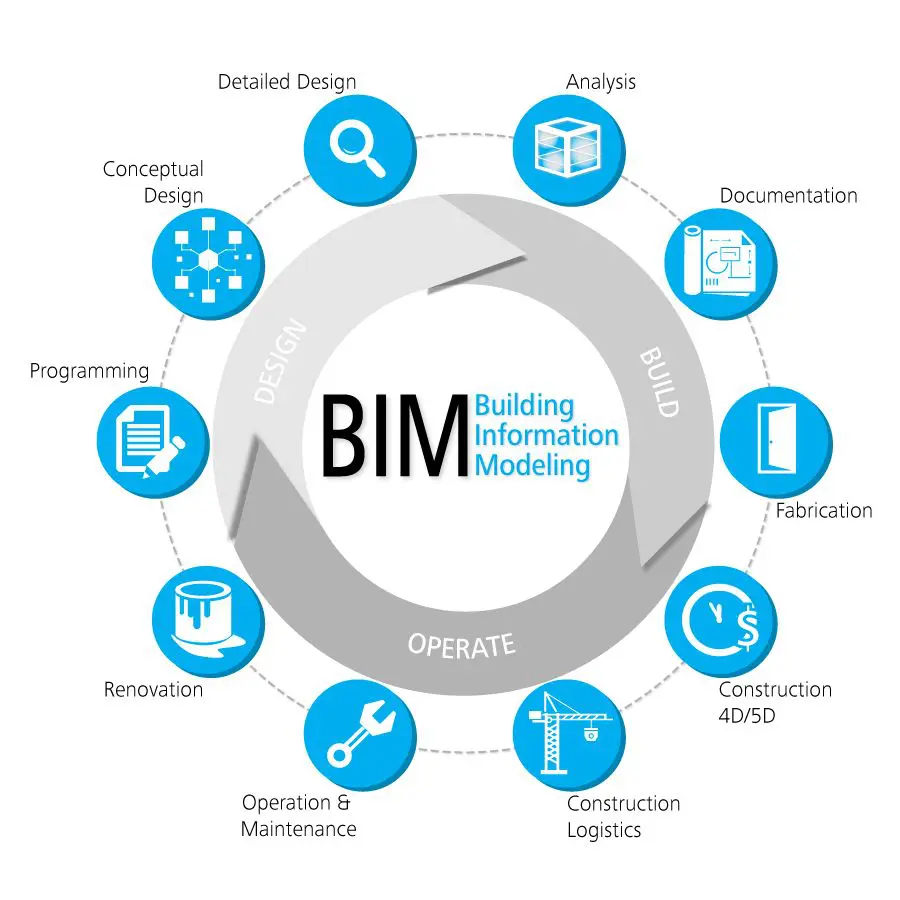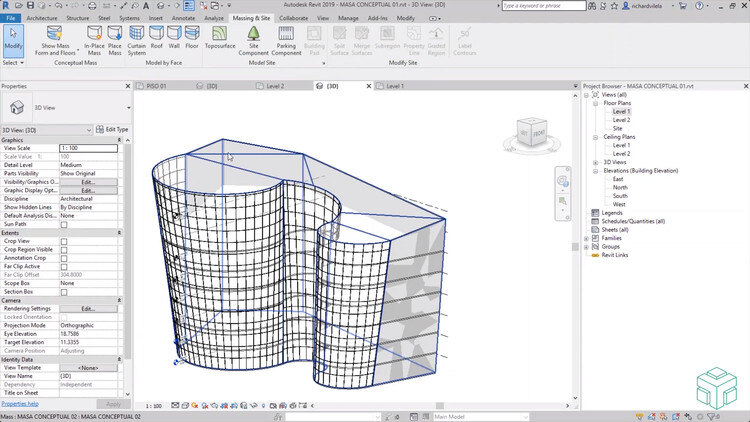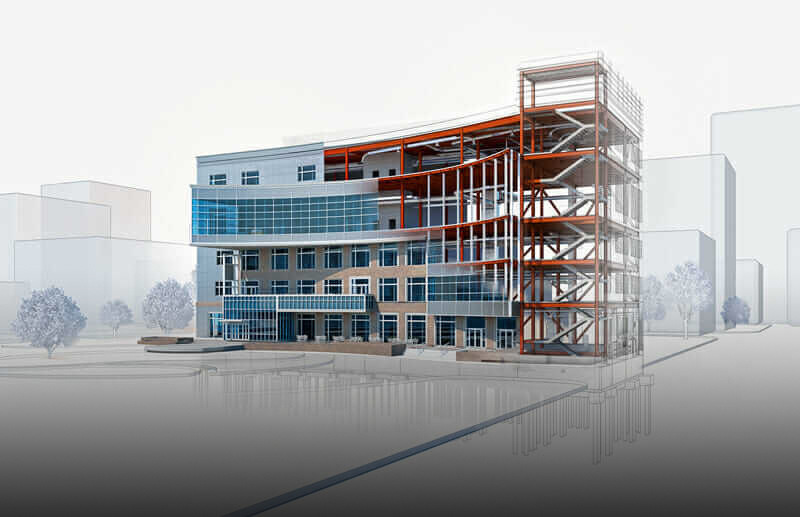BIM Engineer: Roles, Salaries, and Courses to Become One

Table of Contents
Building Information Modeling (BIM) is a collaborative approach that streamlines how to plan, design, and construct a building within a single 3D model. It allows architects, engineers, contractors, and other stakeholders to integrate critical data and information that define design elements and their associations. This comprehensive digital representation acts as a virtual prototype of the building, allowing stakeholders to visualise and comprehend the entire lifecycle of a structure, identifying and evaluating potential issues before any construction work begins. BIM has provided a new dimension to the AEC industry and saved much effort, time, and money compared to traditional methods.
The impact of BIM has given rise to the emergence of BIM engineers, enabling them to perform in-depth analysis and simulations, resulting in more efficient and affordable solutions. BIM engineers can leverage the power of digitalisation to streamline their workflow and oversee multiple projects simultaneously. Civil engineers proficient in BIM not only position themselves to adapt to new methodologies and tools but are also better prepared for the evolving landscape of the construction industry.
In this blog, we will explore the roles and responsibilities of BIM engineers, the demand and scope for their expertise, salaries, and even a list of BIM courses for aspiring BIM engineers.
What Does a BIM Engineer Do?
A BIM engineer is a specialised engineer who is well-versed in BIM software and uses his knowledge to design and construct structures, ensuring that all aspects of the building are properly planned and coordinated. They collaborate with a team of skilled engineers proficient in operating BIM models and take active steps to access the full potential of the software.
Read more: A Closer Look at the Scope of BIM in Civil Engineering
Roles and Responsibilities of a BIM Engineer
The roles and responsibilities of a BIM engineer span from the initial conceptualisation to the final construction phase. However, it can vary depending on the type, scale, and requirements of the project. Below are a few major responsibilities of BIM engineers:
- BIM engineers collaborate with architects, engineers, real estate developers, and other stakeholders, ensuring a seamless integration of BIM technology throughout the project. They act as coordinators, managing digital models, and contributing to design optimisation.
- They play a major role in data management, overseeing the creation, organisation, and maintenance of digital models.
- By promoting effective communication and information exchanges, they streamline project workflows, reducing errors and improving overall performance and efficiency.
- They are responsible for managing project outputs like drawings and documents.
- BIM engineers monitor the project expenditure.
- They provide continuous support to the team and coordinate with clients.
- BIM engineers engage in detailed analysis and documentation. They harness BIM tools to conduct simulations, clash detection, and performance analysis, providing valuable insights for project optimisation. The documentation ensures that every aspect of the project is recorded, creating a digital footprint for future reference.
- BIM engineers need to work in diverse construction environments like commercial, industrial, educational, and healthcare-related projects.
- They identify and resolve potential conflicts both in the design and execution process.
Scope and Demand for BIM Engineers
The growing importance of BIM engineers in the AEC industry is a catalyst for efficiency, offering a collaborative platform that blurs boundaries between interdisciplinary teams, enabling communication and clash detection in real time during the design phase. From carrying out large-scale infrastructure projects to intricate construction designs, BIM engineers have become indispensable for modern construction.
The scope of BIM engineers offers a holistic and data-rich approach, extending across the entire project life cycle. They ensure all the systems, from structural to electrical, are in sync and support accurate quantity take-offs, safety planning and scheduling. Their ability to navigate the complexities of digital modelling, data management, and coordination makes them key players in construction technology. Organisations recognise the value that BIM engineers bring to the table, increasing the demand for professionals skilled in BIM methodologies.
BIM Engineer Salaries in India
BIM engineers command competitive salaries reflective of their crucial role in the AEC industry. Salaries vary based on factors such as experience, expertise, and location. As the demand for BIM professionals continues to surge, salary trends indicate a promising outlook for those pursuing a career as BIM structural engineers in India.
1. BIM Engineer
An entry-level BIM engineer with minimum experience can make an average of INR 25,000 in India. With a comprehensive knowledge and experience of BIM, an intermediate-level BIM engineer can earn a salary of anywhere between INR 30,000 - 35,000/month. BIM engineers are responsible for designing and understanding documentation and construction processes along with dedicated teamwork.
2. BIM Coordinator
A BIM coordinator’s salary can go all the way up to INR 55,000/month and more. The role of BIM coordinators is somewhat similar to that of a BIM manager, except that they do not need to be responsible for the entire team. Their job is to maintain coordination within the BIM team, overseeing the management of BIM data sets from both internal and external members while reviewing 3D models for accuracy and clash detection.
3. BIM Manager
After a work experience of 5-7 years, a BIM engineer can become a BIM Manager and earn about INR 75,000/month. In MNCs, BIM managers need to conduct rigorous quality checks to ensure that the drawings align with the level of detail set by the stakeholders. The role demands major responsibilities for drawings. Whereas BIM managers in smaller firms typically collaborate and work closely with junior designers to maintain modelling standards.
4. BIM Consultants
With sufficient years of experience, BIM professionals have the option to transition into the role of BIM consultants, particularly for engineering firms that have little to no in-house BIM expertise. They can take charge of handling and managing all of the BIM solutions and negotiate higher salaries or even request their share in each project. There is no limit to how much they can make, ensuring consistent growth with every project. Many engineers, after substantial experience, turn to consultants and also extend their expertise to companies on a global scale.
How do you become a BIM engineer?
To become a BIM engineer, consider the following steps:
a) Educational Qualification:Obtain a bachelor's degree in civil engineering or a related field. A degree is the stepping stone toward a bright career in the AEC industry. It equips you with the basic knowledge and skills required to thrive in the AEC industry
b) Professional Experience:Gain practical experience in civil engineering projects to understand industry standards and workflows. You must do an internship or pick personal projects to build a deeper understanding of the industry standards. This can add to your portfolio and help you land a job.
c) BIM Certification:Enroll in specialized BIM courses, such as Novatr's Professional BIM Course for Civil Engineers, which offers comprehensive training in BIM processes and tools. Such courses help develop a deeper understanding of the technical tools required to advance in the industry.
d) Master BIM Software:Develop proficiency in BIM software like Autodesk Revit, Navisworks, and Civil 3D to effectively create and manage digital models. These softwares gives you an edge both in terms of your resume and your pay. Being a BIM first engineer is becoming a necessity in today’s competitive market.
Also Read - Go From Engineer-in-training to a high paying BIM Professional in 2025
Necessary Skills Required To Become a BIM Engineer?
The right blend of technical and soft skills is required to be a successful BIM Engineer. Knowledge of BIM software and workflows such as Autodesk Revit and Navisworks is essential for creating and managing detailed 3D models. But along with these software foundations, there is a need for the right soft skills including communication and the ability to manage teams and various stakeholders.
Effective communication and collaboration skills are vital for working with multidisciplinary teams, ensuring seamless project execution. Attention to detail and a commitment to continuous learning help maintain accuracy and keep one updated with evolving BIM technologies and industry best practices.
BIM Engineering Courses in India
To meet the escalating demand for skilled BIM engineers, many educational and training programs have surfaced in India. These programs cater to individuals at various career stages, offering flexibility and specialisation. From certification courses to comprehensive degree programs, aspiring BIM engineers can choose educational pathways that suit their goals and circumstances. Several reputed institutions and online platforms provide BIM courses in India. Below is a list of courses that can equip engineers with the technical skills and industry knowledge required for a successful career as a BIM engineer.
1. BIM Professional Course For Civil Engineers by Novatr
Duration: Eight months
Fee: INR 2,45,000
Mode of Study: Online
Placement: Yes
Key Features
Novatr’s BIM Professional Course for Civil Engineers is an exceptional program in the domain of BIM engineering education. This course offers a comprehensive curriculum, guiding participants through the fundamental concepts of information modelling, parametric structure families, documentation, and presentation. It also delves into advanced topics like 3D visualisation, BIM for infrastructure, and 4D and 5D modelling.
The course places a strong emphasis on practical skills, addressing key aspects such as cloud collaboration, streamlined workflows, coordination, and clash detection. What sets it apart is the guidance provided by industry experts throughout the learning period. By the end of the course, participants are encouraged to apply their understanding through a real-world RIBA-structured capstone project. It is an ideal course for engineers looking to upskill themselves.
Read more: BIM for Structural Engineers: Top Benefits, Significance, and Work Opportunities
2. BIM Ready (Arch+ Structure) by TechnoStruct Academy

Duration: 3.5 months
Fee: INR 70,500
Mode of Study: Online
Placement: Yes
Key Features
The BIM course at TechnoStruct Academy in Delhi is designed for civil engineers aiming to specialise in the structural aspects of BIM. This program extensively explores BIM tools, processes, and workflows specifically tailored for structural design, providing a focused and comprehensive understanding of BIM concepts. Enrolling in this BIM course equips civil engineers with practical experience in applying BIM tools for structural designs. The skills acquired upon taking this course empower engineers to make the most of BIM knowledge for accurate structural analysis, design optimisation, and collaboration with various stakeholders.
3. MBA in Digital Transformation and BIM management by NICMAR
Duration: Two years
Fee: INR 12,00,000
Mode of Study: On-campus
Placement: Yes
Key Features
The National Institute of Construction Management and Research (NICMAR) offers a unique postgraduate program that’s a blend of business management and BIM expertise. It is a perfect choice for professionals aspiring to become leaders in the BIM field within the construction industry. Based in Pune, this BIM course not only imparts essential BIM skills but also hones an individual’s ability to manage BIM projects effectively. This combination of technical know-how and management proficiency is highly valuable in today’s context, where BIM continues to become more relevant to the success of construction projects. After completing this course, individuals are prepared to integrate BIM into the organisation’s workflows and processes.
4. BIM Course by Capricot
Duration: Not defined
Fee: Requires you to register
Mode of Study: Online
Placement: Yes
Key Features
This comprehensive BIM course covers a variety of BIM topics of diverse skill levels catering to all civil engineers. The program blends theoretical knowledge with practical application, ensuring that participants understand the concepts and learn how to apply them in real-life scenarios. It covers different aspects of BIM for civil engineers, including modelling, coordination, project management, clash detection, and team collaboration. Whether you’re a beginner starting from scratch and want to understand the basics of BIM or an experienced engineer wanting to improve your expertise, Capricot’s course is suitable for every stage of your engineering career.
5. Autodesk Revit for Structural BIM Modeling by Multisoft Systems
Duration: Not defined
Fee: Not defined
Mode of Study: Online
Placement: No
Key Features
Offered by Multisoft System, this specialised training program focuses on Revit Structure, a pivotal BIM software extensively used by civil engineers. Renowned for creating intricate structural designs and conducting analysis, this course is meticulously designed to empower civil engineers with the skills needed to fully leverage the potential of the software. It includes hands-on training covering various aspects of Revit Structure, such as modelling, analysis, detailing, and collaboration. While this course does not provide comprehensive training in BIM for civil engineers, it creates a solid foundation for structural design and analysis, enabling them to develop accurate structural models.
Conclusion
The scope of BIM engineers is transformative and far-reaching. With the ongoing technological evolution within the AEC industry, the potential for BIM engineers continues to expand, offering a range of benefits and career opportunities. BIM is helping drive efficiency and innovation, making it necessary for engineers to be up-to-date with technology. If you’re an engineer, you must consider developing such skills and give your career an edge. These BIM tools and software can help you design better by accurately analysing and modifying models and also enabling you to work on complex structures. With the BIM courses mentioned above, you can invest in upskilling yourself and be future-ready.
One such course that’s industry-relevant and can help you achieve your goals is the BIM Professional Course for Civil Engineers, offered by Novatr. You can master 10+ BIM software, learn from industry experts and also work on a capstone project to implement your learnings.
To know more about BIM and how it is helping civil engineers, head to our Resources page.

 Thanks for connecting!
Thanks for connecting!
.jpg)



.png)





